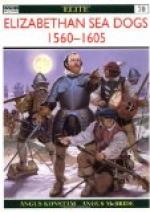No dreams of any Golden West had Drake as yet. To the boy in his teens Westward Ho! meant nothing more than the usual cry of London boatmen touting for fares up-stream. But, before he went out with Sir John Hawkins, on the ‘troublesome’ voyage which we have just followed, he must have had a foretaste of something like his future raiding of the Spanish Main; for the Channel swarmed with Protestant privateers, no gentler, when they caught a Spaniard, than Spaniards were when they caught them. He was twenty-two when he went out with Hawkins and would be in his twenty-fourth year when he returned to England in the little Judith after the murderous Spanish treachery at San Juan de Ulua.
Just as the winter night was closing in, on the 20th of January, 1569, the Judith sailed into Plymouth. Drake landed. William Hawkins, John’s brother, wrote a petition to the Queen-in-Council for letters-of-marque in reprisal for Ulua, and Drake dashed off for London with the missive almost before the ink was dry. Now it happened that a Spanish treasure fleet, carrying money from Italy and bound for Antwerp, had been driven into Plymouth and neighboring ports by Huguenot privateers. This money was urgently needed by Alva, the very capable but ruthless governor of the Spanish Netherlands, who, having just drowned the rebellious Dutch in blood, was now erecting a colossal statue to himself for having ’extinguished sedition, chastised rebellion, restored religion, secured justice, and established peace.’ The Spanish ambassador therefore obtained leave to bring it overland to Dover.
But no sooner had Elizabeth signed the order of safe conduct than in came Drake with the news of San Juan de Ulua. Elizabeth at once saw that all the English sea-dogs would be flaming for revenge. Everyone saw that the treasure would be safer now in England than aboard any Spanish vessel in the Channel. So, on the ground that the gold, though payable to Philip’s representative in Antwerp, was still the property of the Italian bankers who advanced it, Elizabeth sent orders down post-haste to commandeer it. The enraged ambassador advised Alva to seize everything English in the Netherlands. Elizabeth in turn seized everything Spanish in England. Elizabeth now held the diplomatic trumps; for existing treaties provided that there should be no reprisals without a reasonable delay; and Alva had seized English property before giving Elizabeth the customary time to explain.
John Hawkins entered Plymouth five days later than Drake and started for London with four pack horses carrying all he had saved from the wreck. By the irony of fate he travelled up to town in the rear of the long procession that carried the commandeered Spanish gold.
The plot thickened fast; for England was now on the brink of war with France over the secret aid Englishmen had been giving to the Huguenots at La Rochelle. But suddenly Elizabeth was all smiles and affability for France. And when her two great merchant fleets put out to sea, one, the wine-fleet, bound for La Rochelle, went with only a small naval escort, just enough to keep the pirates off; while the other, the big wool-fleet, usually sent to Antwerp but now bound for Hamburg, went with a strong fighting escort of regular men-of-war.




